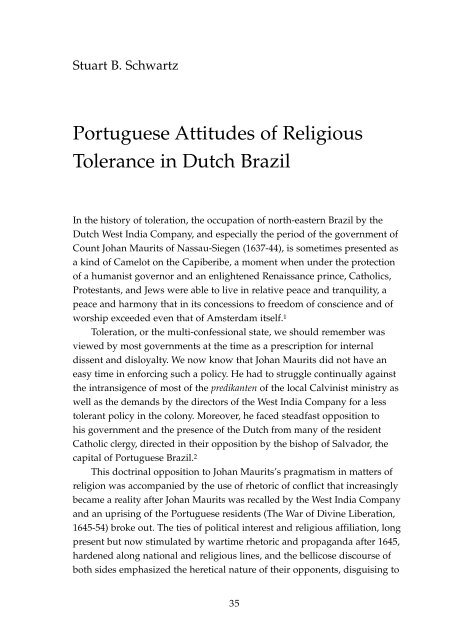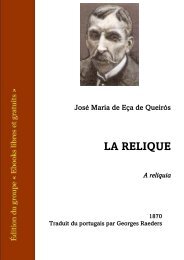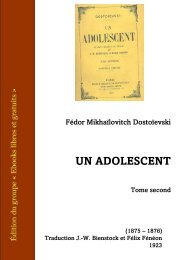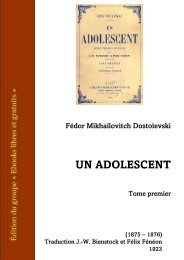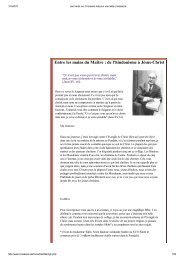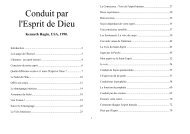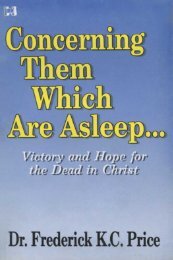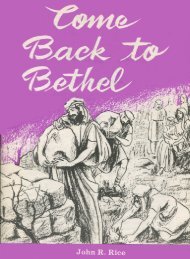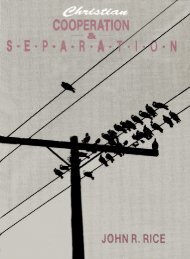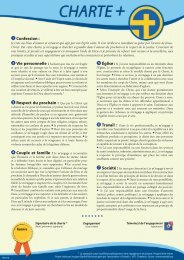The Expansion of tolerance
You also want an ePaper? Increase the reach of your titles
YUMPU automatically turns print PDFs into web optimized ePapers that Google loves.
Stuart B. Schwartz<br />
Portuguese Attitudes <strong>of</strong> Religious<br />
Tolerance in Dutch Brazil<br />
In the history <strong>of</strong> toleration, the occupation <strong>of</strong> north-eastern Brazil by the<br />
Dutch West India Company, and especially the period <strong>of</strong> the government <strong>of</strong><br />
Count Johan Maurits <strong>of</strong> Nassau-Siegen (1637-44), is sometimes presented as<br />
a kind <strong>of</strong> Camelot on the Capiberibe, a moment when under the protection<br />
<strong>of</strong> a humanist governor and an enlightened Renaissance prince, Catholics,<br />
Protestants, and Jews were able to live in relative peace and tranquility, a<br />
peace and harmony that in its concessions to freedom <strong>of</strong> conscience and <strong>of</strong><br />
worship exceeded even that <strong>of</strong> Amsterdam itself. 1<br />
Toleration, or the multi-confessional state, we should remember was<br />
viewed by most governments at the time as a prescription for internal<br />
dissent and disloyalty. We now know that Johan Maurits did not have an<br />
easy time in enforcing such a policy. He had to struggle continually against<br />
the intransigence <strong>of</strong> most <strong>of</strong> the predikanten <strong>of</strong> the local Calvinist ministry as<br />
well as the demands by the directors <strong>of</strong> the West India Company for a less<br />
tolerant policy in the colony. Moreover, he faced steadfast opposition to<br />
his government and the presence <strong>of</strong> the Dutch from many <strong>of</strong> the resident<br />
Catholic clergy, directed in their opposition by the bishop <strong>of</strong> Salvador, the<br />
capital <strong>of</strong> Portuguese Brazil. 2<br />
This doctrinal opposition to Johan Maurits’s pragmatism in matters <strong>of</strong><br />
religion was accompanied by the use <strong>of</strong> rhetoric <strong>of</strong> conflict that increasingly<br />
became a reality after Johan Maurits was recalled by the West India Company<br />
and an uprising <strong>of</strong> the Portuguese residents (<strong>The</strong> War <strong>of</strong> Divine Liberation,<br />
1645-54) broke out. <strong>The</strong> ties <strong>of</strong> political interest and religious affiliation, long<br />
present but now stimulated by wartime rhetoric and propaganda after 1645,<br />
hardened along national and religious lines, and the bellicose discourse <strong>of</strong><br />
both sides emphasized the heretical nature <strong>of</strong> their opponents, disguising to<br />
35


